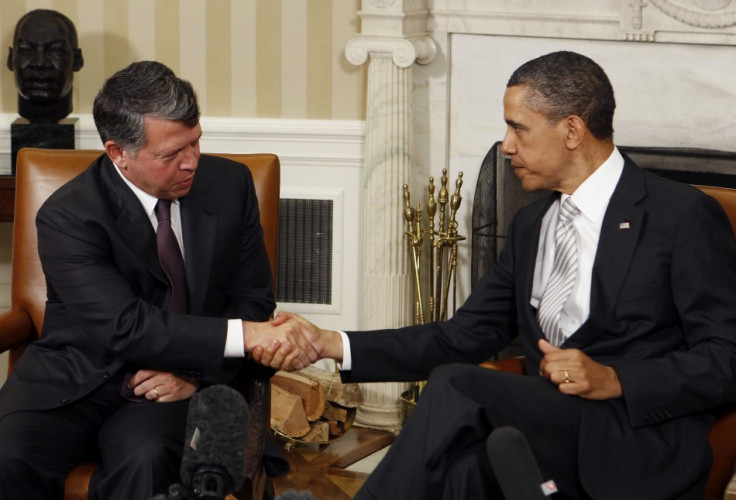Obama: Israeli and Palestinian peace talks "more vital than ever"

As talks between Israel and Palestine have been frozen since last year because of a dispute over settlements, Barack Obama said the US and Jordan both wanted Israelis and Palestinians to go back to the negotiating table, adding that it was "more vital than ever" for Israelis and Palestinians to restart negotiations on a peace deal.
Mr Obama hinted at the role played by the US in middle-east negotiations insisting on its will to continue to try and find an "equitable and just" solution to a conflict that has now been going on for more than a hundred years. Without an agreement, "more blood will be shed", and "this Holy Land will remain a symbol of our differences, instead of our common humanity" the US president added. Mahmoud Abbas, the Palestinian Authority President was in the assembly and Obama's call for a Palestinian state drew a burst of applause. The speech came just a few days after Abbas had threatened to walk out of the latest round of talks if Israel does not extend a moratorium on the construction of Jewish settlements in the West Bank.
The president's statement came after his meeting in Washington with Jordan's King Abdullah II, which pre-empted the beginning of a week of intense Middle East diplomacy, as in the following days, the US president will also meet with Israeli Prime Minister Benjamin Netanyahu. Also, on Thursday he is scheduled to make an important speech on the implications of the Arab uprisings.
Renewing talks
The visit of King Abdullah II and the announcement of a close cooperation between the US and Jordan confirms Jordan as a strong ally of the US in the troubled region. As Obama insisted on Jordan's determination to resolve the relationship between Israel and the Palestinians he also called for world leaders to forget favouritism towards either side:
"Those of us who are friends of Israel must understand that true security for the Jewish state requires an independent Palestine," he said.
"And those of us who are friends of the Palestinians must understand that the rights of the Palestinian people will be won only through peaceful means - including genuine reconciliation with a secure Israel.
The president said the Jordan's King decision to fight for a solution leading to the resolution the conflict had been reinforced by the latest political developments in the region since "because of the many changes that have been taking place in the region, it's more vital than ever that both Israelis and Palestinians find a way to get back to the table".
What recipe for peace in the Middle East?
The declaration made by president Obama on the vital character of negotiations because of the changes taking place in the Arab world is certainly a positive input. However like in the many past official public declarations whether from the US or other countries, one main ingredient is missing. How will the US start the peace process and does the idea of peace between Israel and Palestine truly fit in with the realities on the ground? With Israeli Prime minister Binyamin Netanyahu, calling the recent signature of a peace deal between Hamas and Fatah in Cairo "a tremendous blow to peace and a great victory for terrorism" the possibility of a sudden new found solution to ease the conflict seems doubtful.
Whatever President Obama's plan is, we will probably have to wait for his scheduled and awaited speech on the region tomorrow, at the State department. In his discourse he is likely to discuss the need for advancement on the Israeli-Palestinian talks, but will also certainly explain and articulate US policy in the Middle East as a region. This seems in turn to prove quite complicated as the recent developments made clear that the US has adopted different positions according to different countries. Last week, the Obama administration also had to deal with the resignation of its Middle East peace envoy George Mitchell.
While Obama asserted that it was crucial for both counties to "begin negotiating a process whereby they can create two states living side by side in peace and security" it seems that the US attitude towards the Israeli-Palestinian conflict will take into account the complexity of the situation on the ground, pushing it to, for now, focus more on conflict management rather than conflict resolution.
Renewed violence in the region last week
Hopes of any potential progress in the talks were also dashed last week by a revival in the increase of violence and demonstrations against Israel in Palestine. The recent changes that have affected the Middle East seem to have contributed to a boost in demonstrations and denouncements of the Israeli government's use of force by the Palestinian people. After demonstrations on Sunday near Israel's border, twelve people are claimed to have been killed. Following the incident Mahmoud Abbas made a fresh appeal on Tuesday for international recognition of an independent Palestinian state as he added in The New York Times newspaper that Palestinians "cannot wait indefinitely" for their own state. Abass has also called for the United Nations General Assembly to vote for an independent Palestine bid in a foreseeable future.
.
© Copyright IBTimes 2024. All rights reserved.





